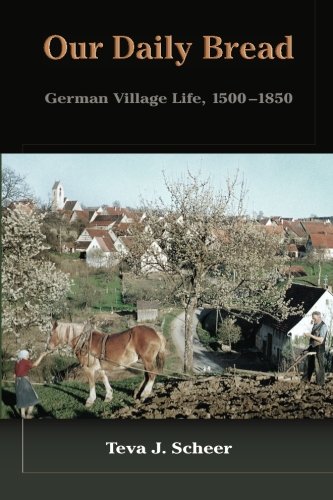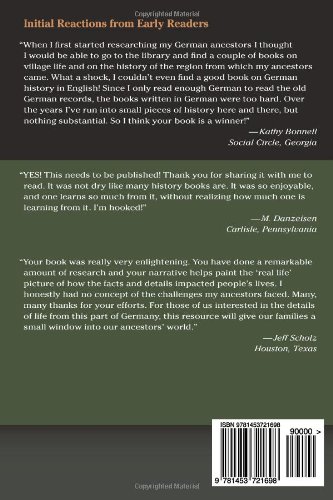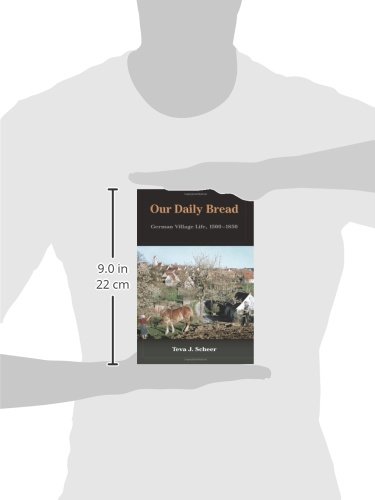Customer Services
Copyright © 2025 Desertcart Holdings Limited




Our Daily Bread: German Village Life, 1500-1850
C**S
Super-interesting and valuable book about daily life and immigration from southwest Germany
I'm doing a bunch of genealogical research about my family lines coming from southwest Germany, which is also the focus of this book's subject, told more in story form following a fictitious family's journey in the area of Baden-Wurttemburg from the 1500s to the 1850s.I loved the several anecdotes of daily life of the family members, whether they were farmers during the 1700s, or emigrants who landed in New Orleans in the 1800s seeking better economic opportunities.This book has just enough detail to keep you interested in how daily life was a great struggle sometimes, and a good source of material if you want to add some local color to your genealogical research, or just corroborate some of your research with other sources.
R**E
Vielen Dank for Daily Bread
“Vielen Dank” from every German corpuscle in my body for Teva Scheer's book Our Daily Bread! In my past 40 years of genealogical sleuthing concerning my roots, I too have been able to “zoom into” my ancestral villages -- in my case, Ranis and Seisla in Thuringia (between Poessneck and Saalfeld). After many virtual trips via Google maps, and even a physical trip to the towns in 2010, I still had so many questions about their daily lives and the circumstances surrounding those lives. Our Daily Bread provides what I had always hoped to find – an account based on a “typical” German village from 1500-1850 adding flesh and bone to the dry record pages of our evangelisch Lutheran history. I am looking forward to many more hours exploring the treasures of this book, and I am looking forward to reading The Harp and the Hand, which I know will provide the daily life description for my husband’s Irish ancestry.
F**E
Couldn't put it down!
Our Daily Bread is one of those books, that made me stop every so often and interrupt my husband's reading: "Oh my god, listen to this!" And that's because this book does exactly what it says it's going to do: for those of us whose families came from Germany, in my case arriving in separate families betwen 1730 and 1870) it gives a very rich and fascinating look at the lives our ancestors had chosen to leave behind. I'd always wondered how so many people could be so convinced they should leave one country for another. I knew some of the reasons, and I knew that those who were first to arrive wrote home to those who remained.But learning about the taxation, the structure of government, the consequences of "bastardy", the social hierarchies, and all the rest, the stories of my families took on a life they'd never had before. I also got a lot of insight into things my great-aunts used to say and so and warn against.When my mother died a few years ago, I found two large boxes of old family letters and photos. In an effort to organize and identify the contents, I began researching my family history which led me to reading a lot of Pennsylvania history. I'd grown up knowing my family was German. (They first came to the US in 1730, with the last major arrival in 1870.) We ate German food, some of the grandparents spoke German when they wanted to cut us kids out of the conversation, although they called their dialect "Dutchy." I knew all about re-entering the house through the same door you'd left by (or vice versa) so as not to "break the circle of the house" and leave it open to evil spirits. ("Nonsense!" said my mother, while a few older relatives shook warning fingers at me...)Our Daily Bread, by showing me the circumstances and conditions of German village life, showed me where indeed my family had come from and why they had left.I can't recommend it highly enough to anyone interested in the so-called "great migration" of Germans or in the histrory of eastern PA, and anywhere else German families settled.But then, somehow, I came upon this book. It was one of those books, that prompted me to say, "Oh my god, listen to this!" And that's because this book does exactly what it says it's going to do:
J**D
A Must Read on the life/history of Germany and immigrants and why they came to America
Although this is suppose to be a fiction book on the life of Germans in the early 1800s to 1850s. It is Both a fiction and non fiction book. It covers the political, religious, economic and social history of Germany from the 1500s to the 1850s.Set in Southwest Germany (Exactly were part of my family came from to America in 1852) it also explains the differences in the different parts of Germany (the rest of my family came to America from the Northeast Part (Pommerania) in the 1880s. To understand what like was like for your ancestors (if you are German Ethnic, which one quarter of Americans are, this is a MUST READ. I CANNOT RECOMMEND THIS BOOK ENOUGHT!!!!!! Not only a great geology book, but book on why our ancestors left everything for a new life in America.
P**I
The Human side of Genealogy
I wish there were more books like this one. Genealogy is more than just dates. Stories like these, based on life experiences of real people ( but not the fictional characters in the book) give a family historian a way to walk in the shoes of their ancestors for a bit, and help answer some of the never ending how and why questions one has while researching a family tree. This was an eye-opening read.
B**R
Great insight into the life of our ancestors!
I found this book eye-opening as to the life that my ancestors would have led in Germany in the 19th century. It answered many of my questions. Did they cook on a hearth or a wood stove? What crops did they grow? What were the different roles of men and women? What did they do for fun? These and more questions are answered in this easy-to-read book. It is written both as an informational book and an interesting story of one fictional family to exemplify the details. Thank you, Teva Scheer for your research!
D**R
Everything you wanted to know about your German ancestors
This book explains in precise, foot-noted and readable writing what day-to-day life was like in German towns, villages and farms 1500-1850. Religion, war, village governance, marriage and inheritance to work and emigration, Teva Scheer takes the reader inside the houses and huts of the peasants and serfs. A glossary of German words is enormously helpful to genealogists, and even the 22 pages of footnotes are packed with fascinating details of the details.
M**B
Our Daily Bread
I have no idea of German life before basically today though I did know it was not Germany as we know it - rather a mass of kingdoms. The actual way of inheriting things, the rights and responsibilities the citizens have, I had no idea.I am keen on genealogy and have a German/Prussian set of great great grandparents. They came to England, separately, befopre marriage, but I had no idea why or when. this is helping me understand it a little more.
A**R
A great read for anyone with ancestors from Germany
I read this book when I borrowed it from a friend and was so impressed I had to get my own copy. Have also recommended to all the family on our family newsletter list of over 200. It was very easy to read and gave a lot of very interesting information.
B**Y
Our Daily Bread has given me a sense of our ...
Our Daily Bread has given me a sense of our my ancestors lived in their German village before migrating to Australia. It has also improved my knowledge of historical facts of that era and some possible reasons for my ancestors migration.
R**N
great detail, excellent back up info
Well written, great detail, excellent back up info.
R**M
Five Stars
Excellent!
Trustpilot
2 months ago
1 month ago